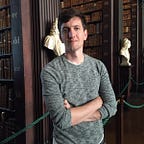Book Review: Losing Earth by Nathaniel Ryan
Losing Earth, by Nathaniel Ryan, started life as a long piece in The New York Times Magazine. I’m not a big reader of US newspapers so I missed it. It’s now been written up as an utterly captivating 200 pages. Its full title is Losing Earth: The Decade We Could Have Stopped Climate Change. That should give you a clue what it’s about.
It is all the things the best journalism always is. Urgent, unadorned, populated by characters painted in full technicolour. Its subject-matter is on one level bone dry. It tracks the myriad ways that the upper echelons of America’s scientific, industrial and political establishment came to realise what was happening to our climate. But on another level, it is anything but dry. It the rich tradition of Sorkin, Iannucci, Gladwell, and Lewis it revels in the rigorous pursuit of knowledge. Glorifies expertise and intellect. The brilliant scientists, tireless policymakers, and committed public servants emerge as the heroes.
Through its accounts of briefing papers, congressional hearings, international summits and backroom deals five things (see what I’ve done there) struck me:
1. Everybody knew before I was born
My political consciousness developed in the ’90s and ’00s. It felt like climate change was an emerging background thing with not much evidence backing it up. That is so wrong. The book charts events from 1979 to 1989. There was, at that point, complete, unequivocal consensus on what was happening. The science has been settled for at least as long as I’ve been alive and in actual fact much longer than that. As Ryan says “nearly every conversation that we have in 2019 about climate change we were having in 1979.”
2. This isn’t a science problem
The science has been fixed for four decades, and the economics, for at least three. This is not a technical problem. One of the things that has held us back is precisely that misunderstanding. We assume technical problems are for technocrats and therefore we shouldn’t involve ourselves. I’d consider myself more comfortable with technocracy than most but this siloed, disengaged approach has been so damaging.
3. The baddies didn’t have to be the baddies
Lots of actors in this account could be easily cast as baddies. Chief scientists of oil majors, industry lobbyists, Republican politicians. All have become synonymous with climate denial or obfuscation. But it was not always thus. I didn’t know that Exxon was ready to shift away from hydrocarbons in the mid-80s. It didn’t know that Republican senators stood in the house and demanded action. It is hard to forgive the inaction but the fact the opportunity wasn’t grasped is desperately sad.
4. Politics used to work
Through the second half of this book, as it becomes more and more about political wrangling, the same word keeps coming up: bipartisan. Climate change used to be an issue that all politicians could act on. What is more unifying than our shared humanity? It seems odd in a book about failure to draw a lesson about things working. But in the same week that the current generation of US politicians worked themselves into paroxysms of fury over Mueller (again) that spirit of co-operation seems like a distant hallowed past.
5. What happens next is hard to even think about:
Given the scale of this collective failure, the ramifications are almost impossible to consider rationally. Ryan puts it better than I could: “no matter how obsessively one follows the politics of climate change, it is difficult to contemplate soberly an existential threat to the species. Our queasiness even infects the language we use to describe it: the banalities of “global warming” and “climate change” perform the linguistic equivalent of rolling on sanitary gloves to palpate a haemorrhaging wound”.
In the end, this is an account of abject failure. A failure to come together and do something, anything, that would help to protect our future. I find it hard to put into acceptable words how angry that sometimes make me feel. Throughout I knew how this story ended but I was willing it to be different. But, my anger and resentment will be nothing compared to what will come. The impact of this destructive path is cruelly inverted. Those who will bear the burden, the world’s poor and the world’s young, are exactly not the people who committed the crimes. They are going to want someone to blame. The price they will demand is hard to fathom.
Ultimately I think Ryan is right:
there can be no civil society without a stable climate. There can be no stable climate without civil society… there can be no future unless it is understood that our future will be commonly shared
That is a lot to think about whilst you enjoy your vegan cappuccino in your surprisingly expensive keep cup. But think we should. It is the essential truth that anyone who wants to change this narrative has to face up to. To quote Ryan again
this talk about the fate of the Earth has nothing to do with the planet’s tolerance for higher temperatures and everything to do with our species’ tolerance for self-delusion
Let’s end that delusion before it’s too late.
This review is Issue #28 of my weekly newsletter 5 Things for Friday. Usually I highlight five things, often but no always related to sustainability, that I’ve read and found useful that week. If you enjoyed it, or if you are feeling your inbox is a little sparse right now, you can subscribe here.
If your thing is longer, more occasional pieces then you’ll probably prefer this blog, with its mix of reviews, pieces on sustainability and whining about Brexit.
